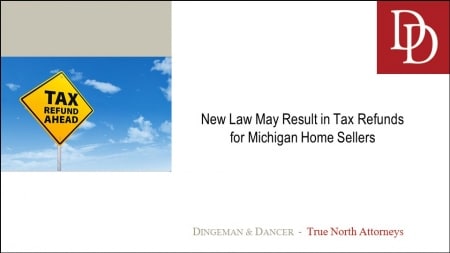
New Law May Result in Tax Refunds for Michigan Home Sellers
Author: Daniel J. Dingeman
This past year, the Michigan Supreme Court opened the door for many more Michigan homeowners to be eligible for a significant tax refund from the State of Michigan. In Gardner v. Department of Treasury, the Court reversed a lower court’s decision that the state real estate transfer tax exemption only applies to sales at a precise dollar amount, holding that the three taxpayers in the case were eligible for an exemption and tax refund. As a result of this decision, many who sold their homes in the last four years are now entitled to a refund of transfer taxes.
Pursuant to Michigan’s State Real Estate Transfer Act, the State of Michigan places a transfer tax of 0.75% on all real estate transfers that do not fall into certain exceptions. To provide homeowners a form of relief from a declining real estate market, the Michigan legislature enacted MCL 207.526(u), which exempts the sale of certain principal residences from this transfer tax. In order to claim the exemption, four requirements must be satisfied:
If a seller has met all of these conditions, he or she is eligible for a refund of any transfer tax paid. What became an issue was how to determine the “true cash value” of property.
The Michigan Court of Appeals concluded that according to the statutory language, the exemption applies only to homes that sell for exactly twice the property’s state equalized value, which is set at half of its true cash value. The Michigan Supreme Court reached a different conclusion, reasoning that was probably not the legislature’s intent when it passed the law.
Instead, the Court opined that the “true cash value” of a piece of property is “a price at which a willing buyer and a willing seller would arrive through arm’s-length negotiation.” In other words, as long as the home sold for fair-market value, the “true cash value” requirement for the tax exemption is met. In support of this interpretation, the Court explained that “[t]he exemption itself was clearly designed to protect sellers and transferors conducting sales in declining or depressed real estate markets so long as those sales are conducted in a legitimate manner.”
The Court’s determination that “true cash value” really means the fair market value that a willing buyer and seller can agree upon through arm’s length negotiation is good news for home sellers. Under current Michigan law, the party that is responsible for the state real estate transfer tax is the seller of the property. As such, the Court’s ruling will ostensibly increase the number of sellers that qualify for the exemption.
If you are in the process of selling your home and believe you are eligible for the exemption, there is specific language that must be placed in the deed when you sell your property in order to avoid the state real estate transfer tax. Make sure to discuss this important change in the law with any realtor or other professional that you may be working with to sell your property.
If you sold your house in the past four years and believe you are eligible for the exemption, the State of Michigan Department of Treasury has a process in place to apply for a refund. If you would like more information about determining exemption eligibility and applying for a refund, please contact the experienced real estate attorneys at Dingeman & Dancer, PLC, 100 Park St., Traverse City, MI 49684, (231) 929-0500.